Key takeaways
- French cinema, particularly works by Éric Rohmer, emphasizes the significance of dialogue in exploring human emotions and relationships.
- Rohmer’s films often tackle themes of love, morality, and friendship, encouraging viewers to reflect on their own choices and experiences.
- Authentic conversations in Rohmer’s works highlight the power of communication in shaping our understanding of ourselves and our relationships.
- Key lessons include the importance of honest dialogue, the complexities of desires, and the role of reflection in personal growth.
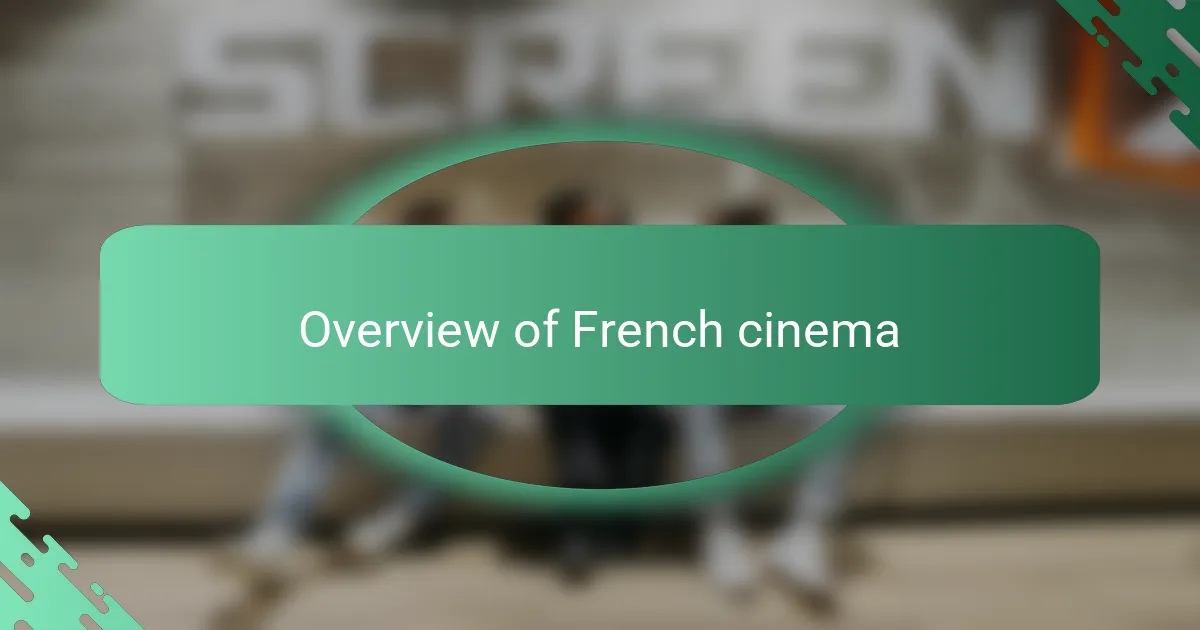
Overview of French cinema
French cinema has a rich and diverse history that has shaped global filmmaking. From the innovative narratives of the New Wave to contemporary masterpieces, each era reflects a unique aspect of French culture. I often find myself drawn to the way French films explore complex human emotions and relationships, which makes them resonate on a deeper level.
One of the most fascinating elements of French cinema is its willingness to embrace conversation as a storytelling tool. Directors like Éric Rohmer exemplify this beautifully, creating films steeped in dialogue that draw viewers into intimate and thought-provoking exchanges. Have you ever left a movie feeling like you just shared a profound chat over coffee? That’s the magic of French cinema, inviting us to revel in the power of words and connection.
Moreover, the artistic freedom present in French films allows for a variety of genres and styles, from romantic dramas to avant-garde works. I cherish the moments when a film surprises me, pushing the boundaries of storytelling and visual artistry. French cinema has a way of making me reflect on life’s intricacies, almost as if each film is a mirror reflecting my own experiences and emotions.
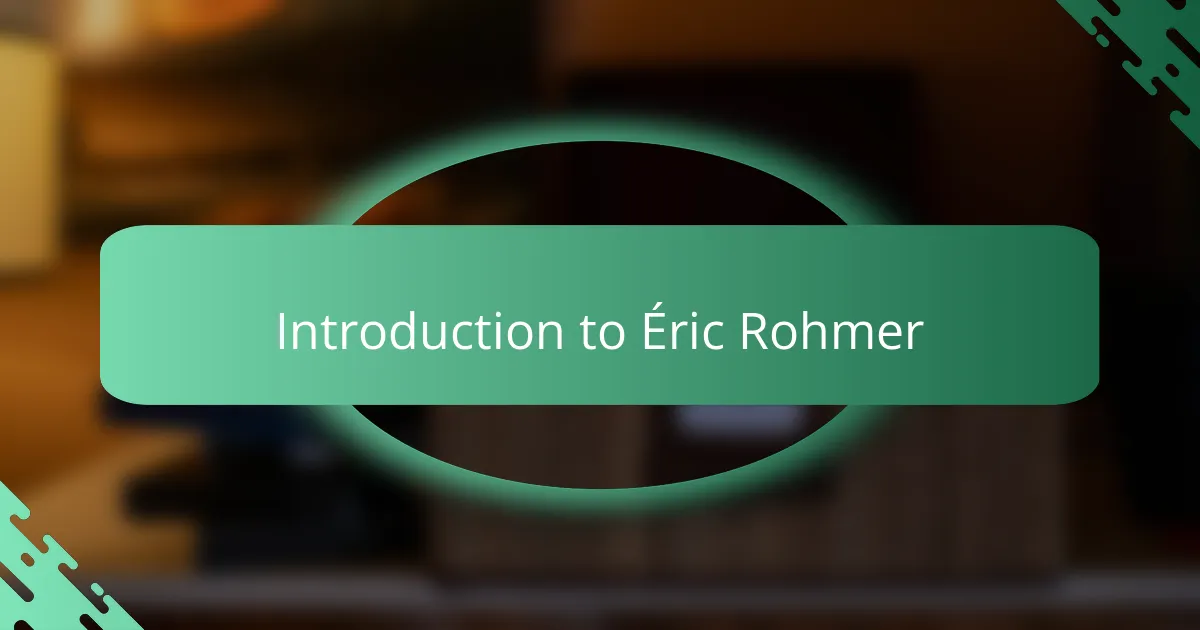
Introduction to Éric Rohmer
Éric Rohmer was a pivotal figure in the French New Wave cinema, known for his unique storytelling and deep exploration of human relationships. I vividly remember the first time I watched one of his films; it was like stepping into a world where dialogue was the heartbeat of the story. His characters often grapple with moral dilemmas, reflecting the complexities of life and love, which resonated deeply with me.
I find his films to be a beautiful blend of simplicity and depth—each conversation feels authentic and relatable. Rohmer had an extraordinary ability to capture the nuances of everyday interactions, which invites viewers to reflect on their own experiences.
| Aspect | Éric Rohmer |
|---|---|
| Era | French New Wave |
| Style | Naturalistic Dialogue |
| Themes | Love, Morality, Relationships |
| Notable Works | “My Night at Maud’s”, “Claire’s Knee” |
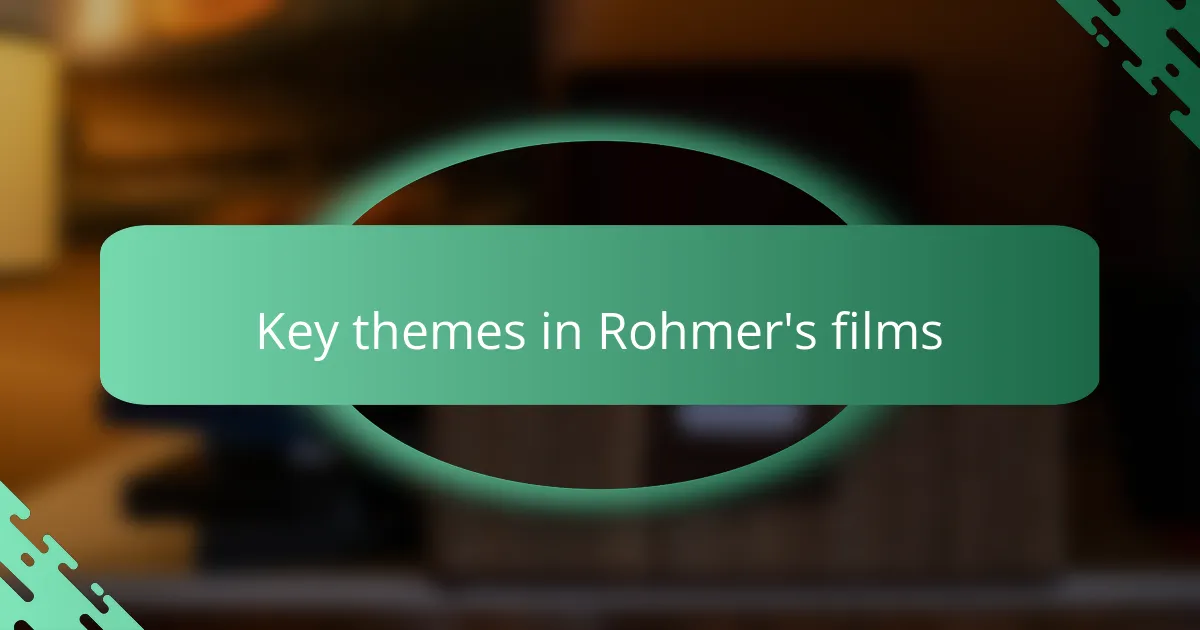
Key themes in Rohmer’s films
Rohmer’s films often delve into the intricate web of love and desire, showcasing how these emotions can complicate even the simplest interactions. I remember being captivated by the characters’ internal conflicts, where even a seemingly mundane choice—like attending a party or a quiet dinner—could lead to profound realizations about themselves and their relationships. It makes you ponder: have you ever made a small decision that spiraled into something much larger than you expected?
Another key theme that stands out in Rohmer’s work is morality and ethical dilemmas. His characters frequently find themselves at crossroads, grappling with choices that test their values and beliefs. Watching them navigate these gray areas made me reflect on my moments of indecision—when do we honor our commitments, and when do we follow our hearts?
Lastly, the nature of friendship is intricately woven throughout Rohmer’s narratives. He expertly portrays how friendships can influence romantic relationships, creating tension that feels both relatable and enlightening. I often think back to the conversations between characters that seemed simple but held deep significance. It’s a reminder of how our friends shape our perceptions and decisions in love.
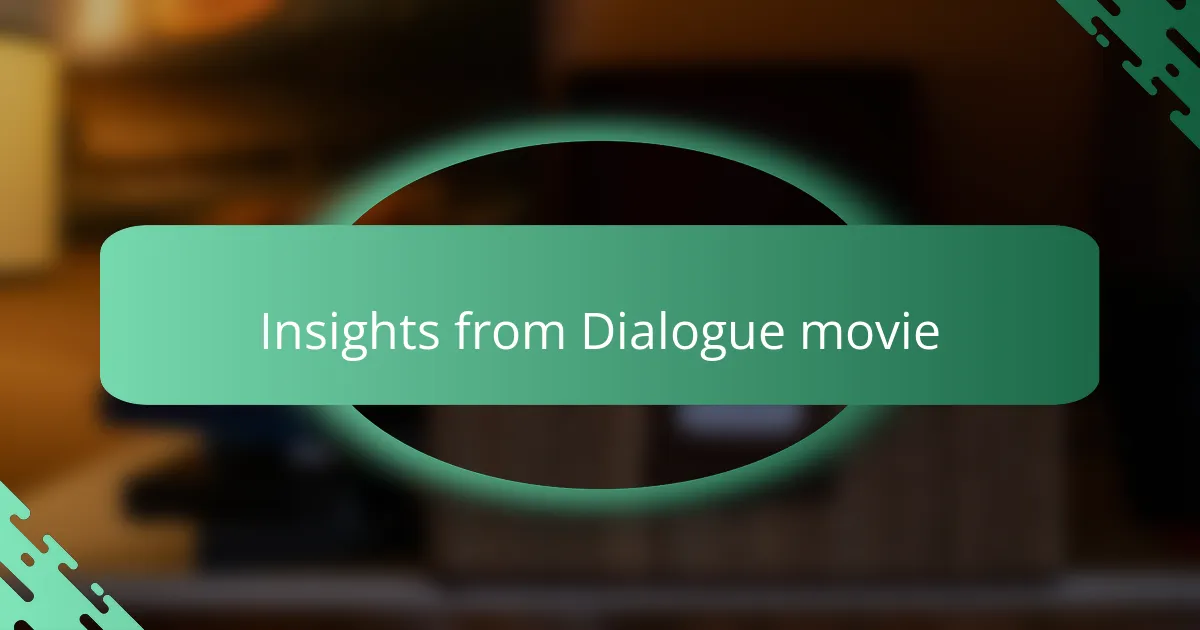
Insights from Dialogue movie
Watching Éric Rohmer’s “Dialogue” was a captivating experience for me. The film’s focus on the nuances of human relationships resonated deeply, especially in how it portrays the subtlety of conversations. I found myself reflecting on my own interactions, realizing how a simple dialogue can carry so much weight and emotion.
What struck me most was the authenticity of the characters. I could almost hear echoes of my own experiences in their exchanges. Their discussions were not just about words; they explored complex feelings and unspoken tensions that I’ve encountered in my own life. It reminded me how much depth can be found in ordinary conversations.
- Rohmer’s characters often grapple with moral dilemmas, reflecting our own real-life choices.
- The dialogue showcases the beauty of intellectual banter, highlighting the richness of exploring ideas together.
- Each conversation in the film serves as a mirror, prompting viewers to evaluate their own relationships and communication styles.
- The pacing of the film allows for reflection, making the subtleties of each conversation linger long after the credits roll.
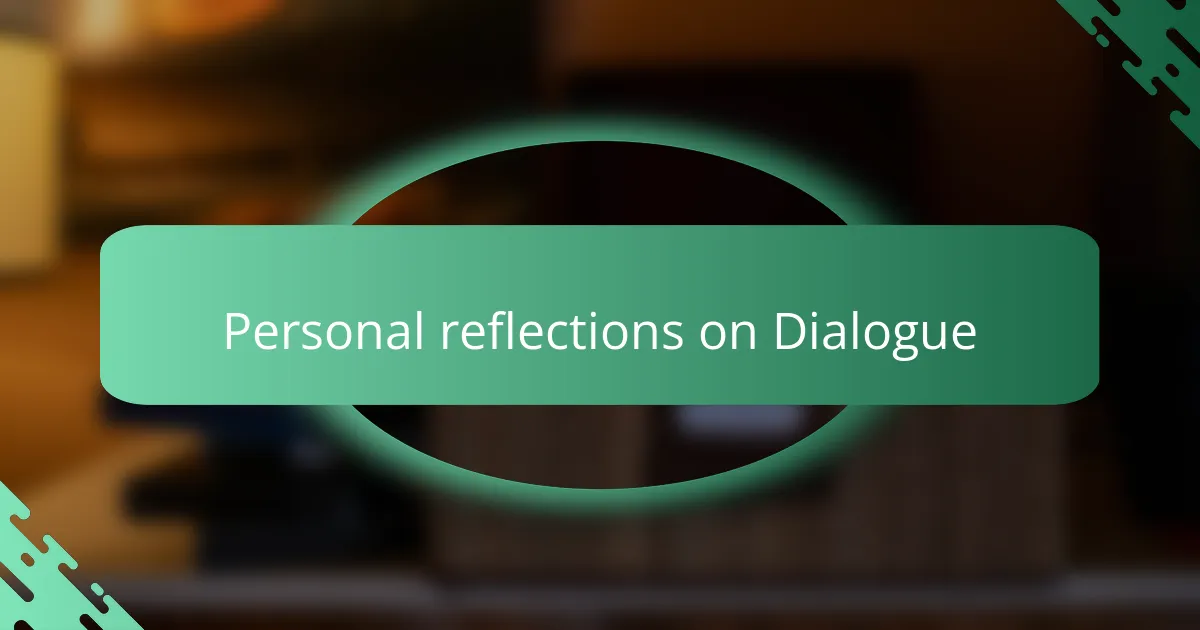
Personal reflections on Dialogue
Engaging with the dialogue in Rohmer’s films has always felt like a personal journey for me. I remember a specific scene from “Dialogue” where two characters unpack their thoughts about love and commitment. It mirrored a conversation I had with a close friend just weeks prior. Hasn’t everyone experienced that moment when a dialogue strikes a chord deep within? This film made me realize how conversations shape our understanding of ourselves.
Each exchange in the film feels like a thread connecting our lives to the characters. I found myself pausing and replaying certain moments, reflecting on how the authenticity in their voices reminded me of my own struggles with expressing vulnerability. Dialogues like these ignited a sense of nostalgia, as I recalled pivotal discussions in my life that have led to fundamental shifts in my perspective.
What I particularly appreciate is how Rohmer captures the art of conversation itself. It challenges us to think about our own dialogues—Are we truly listening, or merely waiting for our turn to speak? This introspection keeps echoing in my mind, allowing me to take a closer look at the relationships surrounding me. It’s fascinating how a single film can spark so much internal dialogue, isn’t it?
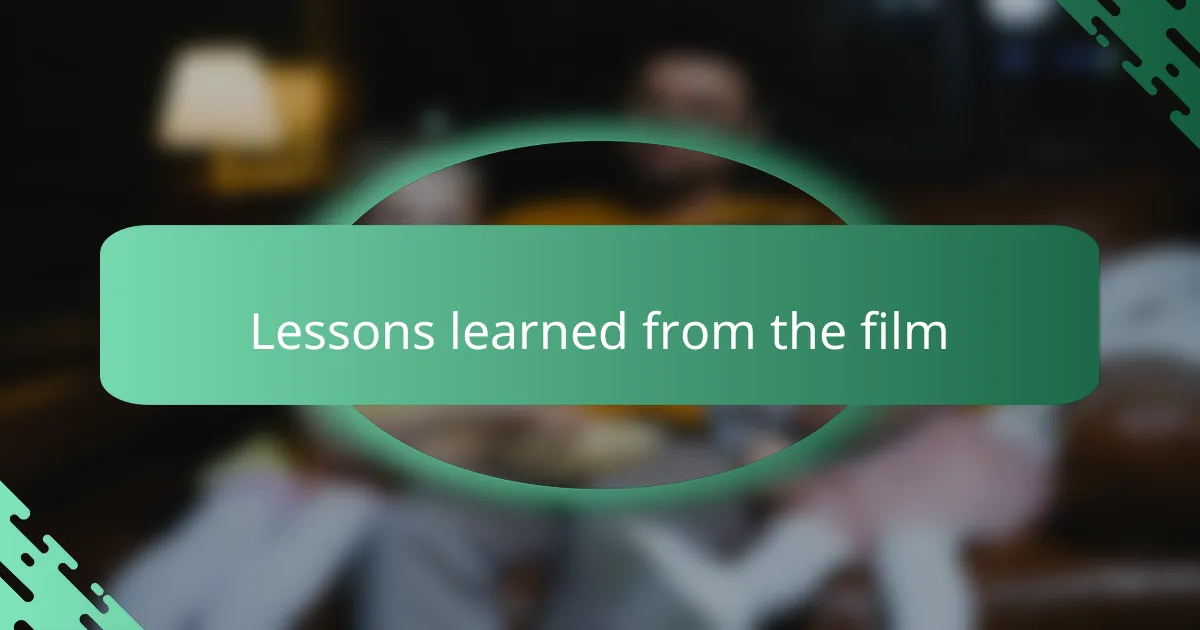
Lessons learned from the film
One of the most significant lessons I learned from Éric Rohmer’s “Dialogue” is the power of communication in shaping relationships. Watching the characters navigate their conversations made me reflect on my own interactions, reminding me of a time when a simple yet honest dialogue transformed a misunderstanding into a deeper connection. I realized that often, it’s not what we say, but how we say it that matters most.
Additionally, Rohmer teaches us about the complexities of human desires and choices. Through the film, I felt a deep empathy for the characters as they grappled with their emotions and motivations, much like moments in my own life where indecision led to self-discovery. It’s a reminder that the paths we choose can define us in ways we often don’t see until we look back.
- Communication is crucial in understanding others.
- Honest dialogue can resolve misunderstandings.
- Emotions and desires are often complex and intertwined.
- Choices shape our identities and experiences.
- Self-reflection through interactions can lead to growth.